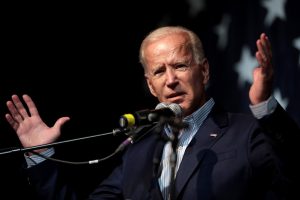Markets Move in Anticipation of Boom Times

President-elect Joe Biden
Yesterday, equity markets the world over went near-ballistic on the news that an effective vaccine had been developed to tame and possibly defeat the novel coronavirus. Already buoyed by Joe Biden’s win in the US presidential election, markets moved even higher after Pfizer announced that a vaccine jointly developed with Germany’s BioNTech was found to be 90 percent effective in late stage trials involving about 43,000 participants.
Pfizer CEO Albert Bourla called the findings ‘a great day for science and humanity’. BioNTech co-founder Ugur Sahin added that the trial result was ‘the best possible outcome’. Dr Anthony Fauci, head of the US National Institute of Allergy and Infectious Diseases, expressed surprise at the vaccine’s 90-percent effectiveness rate and called that ‘just extraordinary’. President-elect Biden remained cautious and warned that it will be ‘many more months’ before every American has been vaccinated and the pandemic brought to an end.
Even though his government didn’t fund Pfizer’s research and development outlays, President Donald Trump sought to claim credit for the breakthrough which he described as an accomplishment of his administration. The pharmaceutical giant immediately moved to distance the company from the White House’s pr-spiel with Senior Vice-President Kathrin Jansen stating bluntly that Pfizer has never taken any money from the US government.
Markets move
Immediately after the news broke, ecstatic investors pushed the blue-chip S&P 500 index up by 3.9 percent at which point profit-taking algorithms kicked in and pulled the index down a few notches for an intraday gain of 1.2 percent. The Russell 2000 index of small caps, said to better reflect the real economy as experienced on Main Street, barrelled ahead and closed the trading day on a 3.7 percent high. The Nasdaq retreated 1.5 percent as investors weighed the impact on tech stocks of an imminent return to societal and economic normality.
The exuberance was tempered, to some degree, by warnings that a global vaccine remains distant as limited production volumes are set to become the next bottleneck. Pfizer’s Bourla revealed that his company can manufacture some 50 million doses of the vaccine this year and an additional 1.3 billion in 2021.
Both the US and Europe have pre-ordered large numbers of doses of the vaccine which will help them move relatively quickly towards herd immunity. Next year’s economic outlook has brightened considerably with analysts expecting a surge in consumer spending as demand pent up during the lockdowns is released. The bulls have it as investors are drawn to stocks that took a severe beating during the pandemic. Shares in airlines, cruise operators, and hospitality companies were amongst the biggest winners in yesterday’s rally.
Rousing start
With global reflation trade off to a rousing start, commodity prices benefitted as well. Emerging market currencies also left the doghouse whilst the dollar and gold lost steam as the demand for safe haven options became less pressing. The yield on the benchmark 10-year US T-bill shot up to 0.9 percent with market watchers predicting a further rise to 1.5 percent should the post-pandemic recovery take off in earnest. Financial stocks rallied too as a result of this rosy panorama.
However, not everyone is convinced that 2021 is destined to turn into a growth fest. Bearish analysts point to the already high valuation of the stock market and wonder how much upside is left before gravity begins exerting its pull. They also argue that the arrival of an effective vaccine was all but a given and has already been factored into the market. Nay-sayers fear moreover that the prospect of an end to the pandemic may prompt governments to withdraw emergency relief to businesses and families sooner rather than later, possibly derailing or delaying an economic take-off.
Wonk Power
US President-elect Joe Biden plans to present Congress with a comprehensive aid bill within hours of taking office on January 20 and expects to get it approved in ten days’ time. Biden promises to free up to $25 billion for vaccine manufacturing and wants to invoke the Defense Production Act to bolster the country’s capacity to produce personal protective equipment.
Although the Trump Administration has so far refused to release the funds and facilities usually awarded to the president-elect and his transition team, Biden is not waiting for a nod from General Services Administrator Emily Murphy, a Trump appointee and self-described ‘wonk’, and is moving ahead from his Delaware headquarters.
Murphy has the sole power to release $6.3 million in federal funds to the transition team and provide secure offices and full access to federal departments and agencies. Biden has been shut out of the State Department which normally routes secure lines to the winning candidate for congratulatory calls from foreign leaders.
Since her appointment in 2017, the GSA administrator has courted controversy by giving ‘incomplete and possibly misleading’ testimony to Congress regarding her role in White House decision making on the proposed move of the FBI headquarters which was halted by Trump who reportedly feared that a commercial developer could turn the vacated J Edgar Hoover Building at 935 Pennsylvania Avenue into a luxury hotel – and take business away from the Trump International located one block down the street. Murphy also has been slow in releasing GSA documents pertaining to the lease of the Old Post Office building and its site – now home to Trump International – to DJT Holdings, a company owned by the US president through a revocable trust.
Aides to the president-elect mull a lawsuit to force the GSA to release funds and facilities to the incoming administration’s transition team. The nonpartisan Center for Presidential Transition, a thinktank of former administrators that helps lay the groundwork for new administrations, urged Trump to ‘immediately begin’ the post-election process and release the resources available under the Presidential Transition Act. In a public message released on Sunday, the centre’s advisory board notes that the president-elect needs to recruit some 4,000 political appointees, including 1,250 whose nomination requires confirmation by the senate.
You’re Fired!
According to bestselling author Michael Lewis, whose 2018 book The Fifth Risk describes the chaotic transfer of power to the Trump team two years earlier, the present administration may be largely unaware of the importance of a smooth transition. At the time, the outgoing Obama Administration had prepared detailed briefs on each federal department and agency, and provided a complete infrastructure for the incoming team, although literally nobody showed up, with some departments waiting for weeks on end after the inauguration to meet the first batch of Trump appointees.
In a recording obtained by news website Axios, Director John McEntee of the White House Presidential Personnel Office warns that any political appointee looking for a new job outside the administration will be instantly terminated. Yesterday, that fate befell Defence Secretary Mark Esper who was summarily dismissed from his job by a Trump tweet. According to White House sources, Trump lost confidence in Esper a few weeks ago after he flatly refused to order the army to intervene in the street protests then taking place in a number of cities, citing the Posse Comitatus Act of 1878 which prevents the use of the military to enforce domestic policy.
You may have an interest in also reading…
Otaviano Canuto: The Global War of Subsidies
US bids to limit tech imports and exports send a message of frustration and fear. Prior to her visit to
Paolo Sironi, IBM: Creating Digital Advantage for Uncertain Times
Changing a car tyre isn’t that hard — unless the vehicle’s moving. And financial institutions have been trying to achieve
European Council’s Van Rompey: Europe Must Overcome Crisis to Defend Democratic Values
European Council President Herman Van Rompuy’s speech “Europe on the World Stage” recently given in London emphasized the complete change


















































































